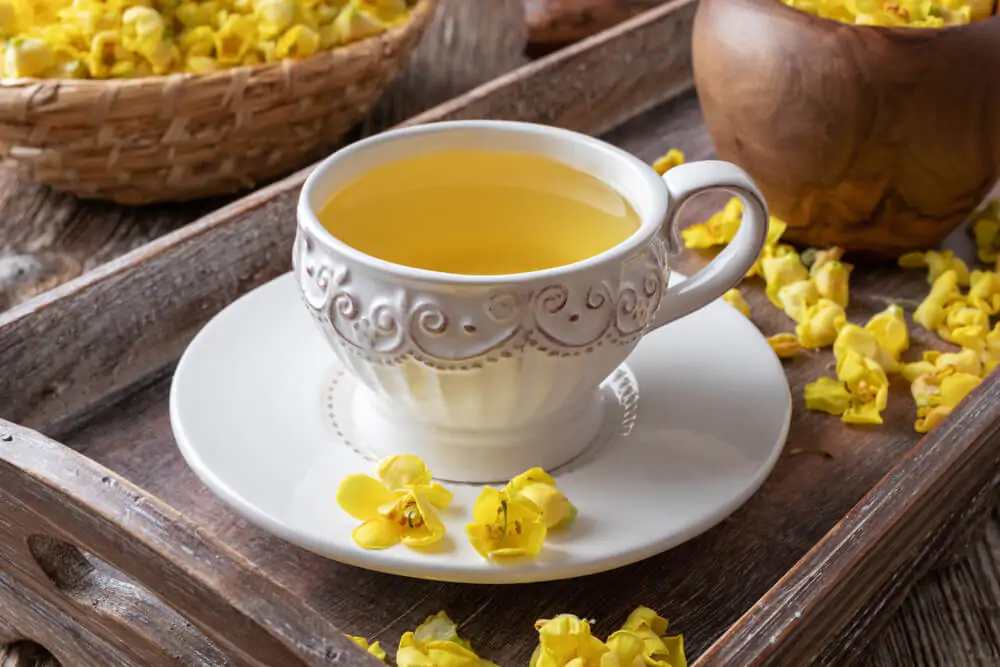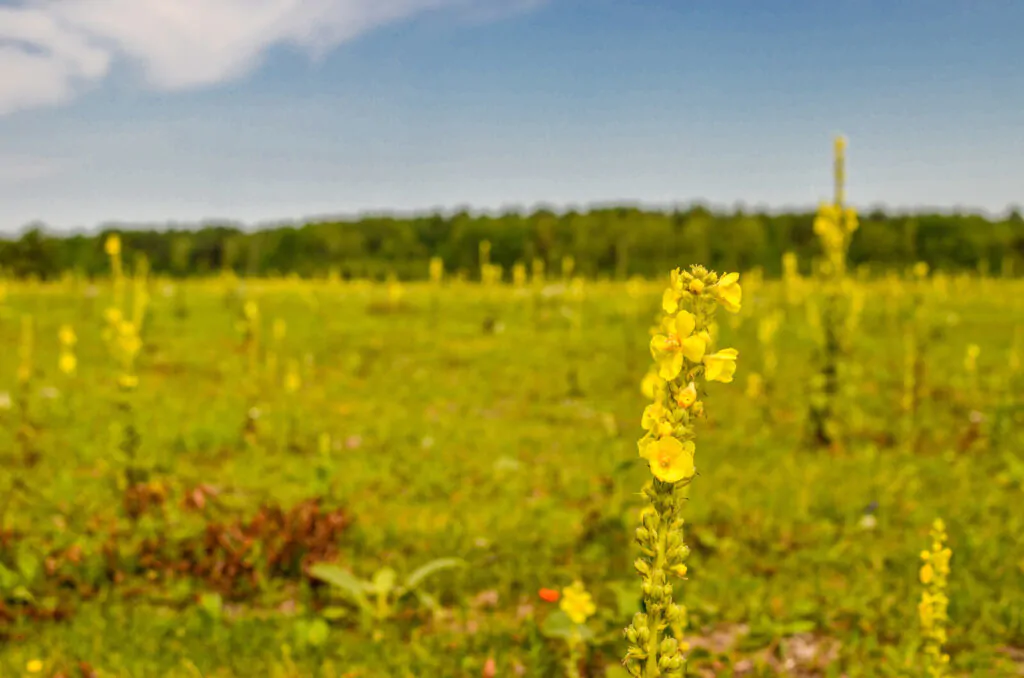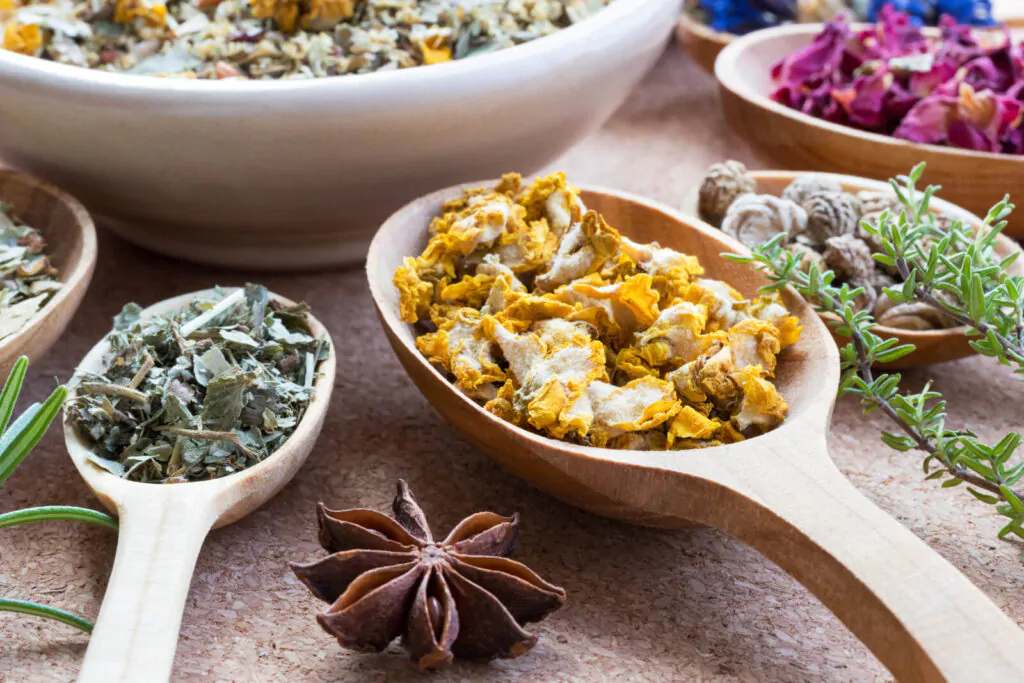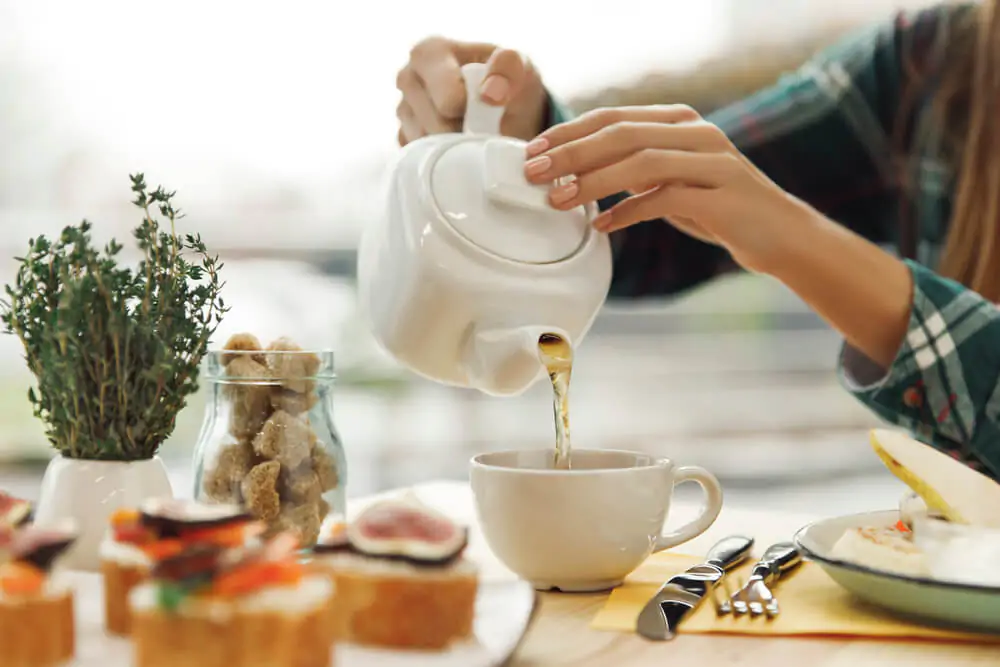Have you wondered, “What is Mullein tea?” Mullein, also known as the flannel leaf, is an earthy-tasting herbal tea with a wide range of potential benefits.

You’ve probably never heard of mullein tea. It’s not nearly as well-known as the more popular types of herbal tea, like peppermint or camomile. Yet, for thousands of years and hundreds of cultures, the mullein plant has been an important medicinal herb.
Mullein tea is a traditional herbal tea steadily becoming more popular due to its numerous health benefits.
Many intriguing names have known mullein tea through the ages – such as the flannel leaf, beggar’s blanket, felt-wort, witch’s candle, Aaron’s rod, lady’s foxglove, donkey’s ears, hag’s taper, and Quaker rouge. While it has faded from the knowledge of many modern tea drinkers, it is well worth a reminder, as mullein tea tastes great and has numerous health benefits.
Mullein Tea Through The Ages

Mullein tea leaves are native to Europe and Asia. It has been respected throughout history as a herb with mystical and magical powers, perhaps thanks to its numerous medical benefits. It was first mentioned over 2,000 years ago by Dioscorides, an Ancient Grecian physician, to be drunk to remedy pulmonary ailments.
In ancient Rome, they used to dip the tall, yellow spikes of the plant in tallow and carry them as flaming, ceremonial torches in funeral processions. People believed the plant offered protection against devils and evil spirits during the Middle Ages if the flowers were carried around.
All through the ancient almanacs and herbal lore of Europe and the Middle East, you will find mullein tea recommended for a wide array of ailments – from coughs and colds to hemorrhoids and varicose veins. In Ireland, right up to the modern-day, this tea is brewed to remedy bronchitis.
You might also be interested in learning what fennel tea is.
Mullein Tea Use In America
Coming over to America with the founding fathers – some say in the dirt used as ballast in their ships – the herb soon spread across the continent. Often called miner’s candle, you could see the soft torches made from this plant down every shaft during the gold rush.
Native Americans burned it over their fires or smoked it along with tobacco, inhaling the smoke for its respiratory benefits. The poor used its velvet-soft leaves to line shoes in winter or made poultices for painful joints.
Health Benefits Of Mullein Tea

Aside from all the folklore and myth surrounding this plant, does mullein tea have any provable benefits in the modern world? It certainly does.
Respiratory Benefits Of Mullein Tea
Studies have shown that mullein tea has excellent benefits for respiratory problems like asthma, bronchitis, and coughs and colds. It is an expectorant, meaning it helps dislodge and remove any excess mucus in the body. Its emollient qualities help soothe the mucus membranes, providing relief from discomfort.
Gargling the cooled tea is very effective for comforting sore throats. Because the tea also has anti-inflammatory qualities, it can soothe swelling and irritation in the throat.
Antibacterial Benefits Of Mullein Tea
Mullein tea has proven anti-bacterial qualities, making it a valuable treatment for infectious diseases and viral infections. One study showed it effectively treated E. coli and Streptococcus pyogenes – which cause illnesses like strep throat and pneumonia.
However, further data is needed to confirm how effective mullein tea can be against these viruses.
Other Benefits Of Mullein Tea
Brewing mullein tea can also relieve headache pain, a result confirmed by a study conducted by Abant Izzet Baysel University. The leaves and flowers of the plant act as a mild sedative when brewed, which can help induce sleep and remedy insomnia.
If you suffer from migraines, drinking mullein tea may help alleviate the symptoms and help you get much-needed rest.
It also improves digestive health, freeing toxins from your system and assisting with constipation through clearing your digestion.
The plant’s anti-inflammatory properties, which soothe and relax, can help people who suffer from muscle aches or conditions such as gout. This same property may also help it treat skin conditions.
This impressive list of health benefits shows that mullein tea is one of the best natural drinks you can take to improve your overall health and wellbeing. While some of these health benefits require further scientific research to confirm, it is safe to say that mullein tea will help anyone with their overall sense of wellness.
If you love tea, you might be interested in learning about yellow tea.
How To Drink Mullein Tea

Mullein tea can be brought either as loose leaves or as teabags. However, as it’s a widespread roadside plant across Europe, Asia, Africa, and the Americas, you can have a go at creating it yourself to get the complete organic and traditional flavor.
Mullein tea is known to have a refreshing, rich, and aromatic flavor profile. It is somewhat similar to a light peppermint herbal tea in taste.
You can brew mullein tea with both the leaves and flowers of the mullein plant. Though still rich and flavourful, the leaves are slightly earthy and bitter, while the flowers have a more delicate sweetness.
Add your leaves or tea bag to boiled water, and then leave it to steep for 15 minutes to half an hour to get the full benefits of its great flavor and soothing properties. If using loose leaves, be sure to strain the tea thoroughly, as the velvety hairs from the leaves can be irritating if they end up in your cup.
If you find the taste too bitter, you can add a little honey to your cup. Some prefer mullein tea as part of a blend, with other flowering herbs such as camomile or calendula, which give it a sweeter flavor profile. This tea also works well with a touch of cinnamon.
If you like this post, you might enjoy learning about the benefits of pine needle tea.
How To Recognise Mullein Tea
Mullein is a tall plant with soft, velvety grey-green leaves. It grows a tall rosette of pale gold flowers up from this cushion of leaves. You can find this hardy plant growing wild in fields and by roadsides across many climates.
In tea form, it retains a soft yellow color from its flowers.
Potential Side Effects Of Mullein Tea
There are very few known side effects of mullein tea, and it is generally safe to consume.
It can cause contact dermatitis in people that are allergic to its leaves. If you have sensitive skin or are prone to allergies, it may be wise to do a contact test of the leaves before consuming the tea or if you feel a tingling sensation after touching it.
If the fine hairs from the leaves of mullein tea are not removed from your brew before it is drunk, this can irritate your throat. So, ensure you remove carefully strain your tea before consumption.
